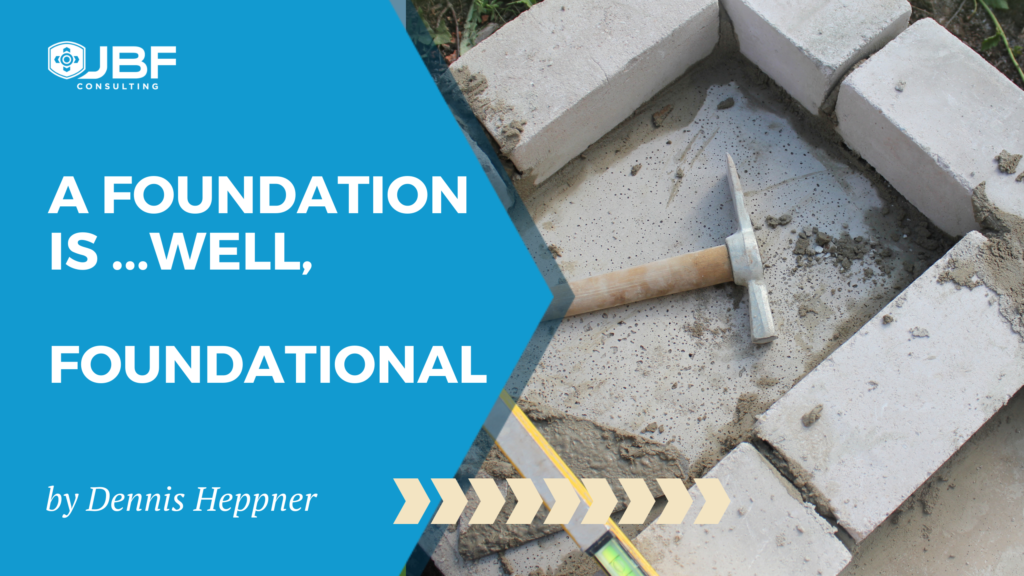Imagine this scenario for a moment. You decided to build a house on a piece of property you just acquired. You are anxious to build your dream home.
You start laying out the floor joists on the ground, build the wall framing on top of that, add rafters and roof, install windows, etc., all the way to completion with window treatments and flooring choices (you don’t bother with permits and building codes).
It goes well and looks pretty good. Then something unexpected starts to happen.
Cracks form in the drywall, moisture accumulates and mildews the flooring, the roof starts to look off-kilter. You do your best to fix these issues, but they turn out to be surface, cosmetic fixes. Hmm, you wonder; what is going on here? You built to your known specs, but the house is becoming uninhabitable.
Then a contractor friend stops by to take a look. Immediately she says
“Who built the foundation? Where is the concrete slab or block walls?”
Your answer?
“I wanted it done quickly and didn’t bother with a foundation.” Well, you can imagine the response and subsequent actions.
“A solid foundation, whether building a house or implementing logistics technology, is critical to success.”
The house was unsafe and had to be dismantled. Wow, this just got really expensive and time-consuming.
Yes, this is a silly scenario. But take this story and compare it to what we see too often when organizations make a substantial effort to deploy a Transportation Management System (TMS).
Too often we see shortcuts, ignorance of governance procedures, and a “full-steam ahead” mentality - single-threaded, jam it in - without consideration of the final state.
The business user has read the blogs and literature. They have fallen in love with ‘name’ technology with a slick website. They think they need cool features and functions. They want the data that lets them have good insights and to make smart, data driven decisions.
But here’s the thing.
They did not get requirements from other key stakeholders and influencers. They did not know what the local ‘code’ was and how long that can take to get approvals.
Tactically, they never set up the environment to get good data, never set up the connections that allow the data to flow, didn't make a solid enough connection with the business partners to make it clear what data they were going to need.
Operating in a vacuum is rarely a good plan.
"Foundational work is hard, sometimes, tedious, and sometimes unseen in the finished product."
What do we coach our clients to do?
Here’s a few lessons that we recommend:
- Involve all affected parties early and often. Overlooking one, seemingly minor process or functional area can easily derail your plans. You would never make a major investment without input from your partner, would you?
- Think right to left. That is, what is the end game?
- What are you trying to accomplish? Do you need basic functionality or is your supply chain quite complex requiring the interaction of multiple solutions? All-electric vs. geo-thermal and solar power?
- Sweat the little stuff early. We endeavor to shed light in the dark corners so we don’t get trapped later in the design or worse, in the build. Did we plan on infrastructure to support a ‘smart’ house?
- How are your needs going to change over time? Build in flexibility to respond to mergers/acquisitions/divestitures or new sales channels or product sources. You want your house to fit your needs when you have children around as well as when you are old and tottering around.
Moral of the story - a solid foundation, whether building a house or implementing logistics technology, is critical to success.
Short cuts, ignorance of rules and process, and unilateral decision-making are rarely a recipe for achieving your goals. Foundational work is hard, sometimes, tedious,and sometimes unseen in the finished product.
But if you want it to stand the test of time there is no alternative.
Dennis Heppner is a Principal at JBF Consulting. Dennis’ expertise in transportation, logistics and supply chain operations, and third-party providers spans 25+ years. His experience is broad-based, spanning entire supply chains, including business process redesign, sourcing, distribution network design, transportation management, distribution operations, outsourcing selection, and business strategy for major manufacturers, distributors, retailers including eCommerce, and service organizations.
About JBF Consulting
Since 2003, we’ve been helping shippers of all sizes and across many industries select, implement and squeeze as much value as possible out of their logistics systems. We speak your language — not consultant-speak – and we get to know you. Our leadership team has over 70 years of logistics and TMS implementation experience. Because we operate in a niche — we’re not all things to all people — our team members have a very specialized skill set: logistics operations experience + transportation technology + communication and problem-solving skills + a bunch of other cool stuff.



